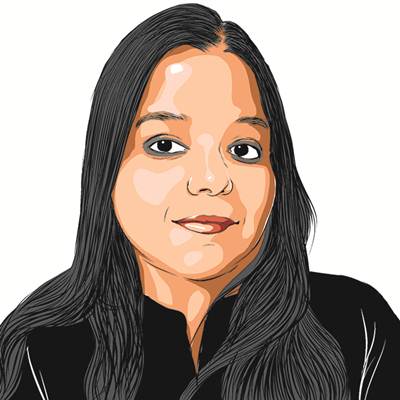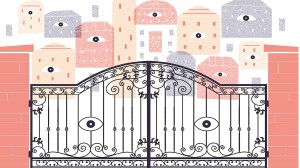Javed Akhtar in Lahore: Children in sub-continent learning English at cost of their mother tongue, banning words making language and culture poorer
Participating in a session at 7th Faiz Festival in Lahore, Javed Akhtar said there was a "competition going on", in India and Pakistan to ban and boycott words, saying that they do not belong to us, without realising that this mentality was only making the language and cultures poorer on both sides of the border.
 Javed Akhtar attended a festival in honour of Faiz Ahmed Faiz in Pakistan.
Javed Akhtar attended a festival in honour of Faiz Ahmed Faiz in Pakistan. Noted Indian poet, lyricist and scriptwriter Javed Akhtar said it was “extremely saddening to see children in the sub-continent learning English at the cost of their mother tongue”.
Participating in a session at 7th Faiz Festival in Lahore, Akhtar said he had “nothing against the English language” and it was essential for children to learn it to achieve success, but they should also stay connected to their own language.
Akhtar, whose lyrics’ Panchhi, nadiya, pawan ke jhonke, koi sarhad na inhe roke’ from the film Refugee still resonate with people from both sides of the border, was asked, ‘what exactly is a language?’.
He replied that a language is described broadly by its script and words, but in reality, it is not. “A script or the words are not languages. The purity of language is a myth. A language only gets richer as more words are added to it. Language is the way you speak. It reflects your cultural history and roots,” said Akhtar.
“For instance, if I say ‘Ye hall air-conditioned hai’. In this sentence, two main words — ‘hall’ and ‘air-conditioned’ — are from English but does that mean I was speaking in English? No, I am not because ‘ye’ and ‘hai’ hold the sentence. Language is related to grammar. It is your own way of speaking, not the words or script,” said Akhtar.
The revered poet, who received wide round of applause from the audience as he reached the stage, further said it was sad and disappointing to see that there was a “competition going on” in India and Pakistan to ban and boycott words, saying ‘ye hamare nahi hai’ (they do not belong to us). This mentality was only making languages and cultures poorer on both sides of the border, he added.
“Hamare yahaan jo zabaan ke thekedaar hai.. wo chahe Urdu ho ya koi language ho… kehte hain ye lafz nikaaliye ye hamara nahi hai… nikaalte rahiye… zubaan patli hoti chali jayegi (Some so-called messiahs of language on our side, either it’s for Urdu or some other language, they say remove this particular word because it is not ours… okay then you keep removing… a language will keep getting poorer),” said Akhtar.
Akhtar, whose song ‘Sandese aate hain’ from the film Border is still popular in both India and Pakistan, said, “For instance, Punjabi is written in Gurmukhi, Farsi and even Devnagri but it remains Punjabi. In our Hindi film posters, such as Pathaan, the name might be written in English alphabets but Pathaan is not an English word. The script is not language. In one sentence, we can use words such as bawarchi, rickshaw, chitta, pistol etc but the fact is that bawarchi is Turkish, rickshaw is Japanese, chitta is Punjabi and pistol is English… Zabaan jitne alfaaz aate rehte hain, utni ameer hoti rehti hai (A language keeps getting richer as more words are added to it),” he said.
“A language is never made in a day; new words get added to it over the years. Our entire cultural history is in our language. You can’t suffocate a culture by banning words. A man has several identities but the most important one is language. When you cut off from a language, you do so from an entire culture, your identity, roots,” he said.
Akhtar said that most parents in the sub-continent now send their children to English-medium schools but that is not the problem. “I have nothing against English. Those who say don’t learn English are your enemies; of course, it is extremely important. But children are now learning English at the cost of their mother tongue. That should not happen. Whatever your mother tongue is — Punjabi, Sindhi, Pashto — you must know it,” he said.
Akhtar said that when a big tree grows, it can only survive if its roots are deeply embedded in the ground. “Angrezi se hi jayengi ye shaakhein lekin jitni shaakhein fail rahi hain, utni jadein gehri ho warna ped gir jayega… (The growing influence of English is like branches of this huge tree which are spreading but roots need to be as much deep else the tree will fall),” he said.
On what he thinks keeps him relevant among the younger generation, Akhtar said that he respects and tries to learn from them. “We can continue to be contemporary only if we learn from younger ones. I do not believe that people born after me have less wisdom or that those born before me had it more than me. In the sub-continent, we are not good listeners. We only wait for the others to finish so that we can speak. We will remain relevant till we maintain a rapport with the young,” he said.
Akhtar said the great Pakistani poet Faiz Ahmad Faiz, in whose memory the festival is being held, is widely followed and read in India even today. “His works had some magic. They are published and read not just in Urdu, but also in Devnagri. His fans are not limited to Pakistan or India,” said Akhtar.













